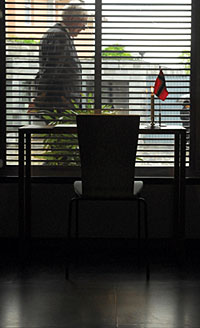 BIKRAM RAI |
Last week's terrible terrorist attacks in Norway made many accepted certainties uncertain once more. It proved that the international media hasn't learnt the lesson from the Oklahoma City bombing in 1995 when US commentators all rushed to blame Islamists, not noticing homegrown terrorism in their own backyard. Timothy McVeigh was a product not of militancy in some faraway desert, but of bigotry and rage against the state at home.
So was Anders Behring Breivik. This time, too, the first reports in wire services and the international news channels immediately rushed to point out Norway's NATO involvement, its sizeable immigrant population, the reprinting of Mohammad cartoons as probable motives, and to pin the blame on Islamic militants. The Wall Street Journal, CNN, and of course Fox News, all succumbed.
Even a week after the disaster, a cursory google search reveals a remarkable reluctance among European commentators to call Breivik a terrorist, a label that would have been automatically conferred on a suicide bomber in Kabul, Israel or London. As Anurag Acharya argues overleaf, we will probably never hear Breivik ever referred to as a "Protestant terrorist". Stereotyping and stigmatisation is so ingrained in the media now that the complexion of the mass murderer determines the label we tag him with.
Noted Norwegian-born peace activist and academic, Johann Galtung, described his country's security apparatus as having "a left eye so sharp that it even sees the non-existing, but a right eye so blind that Breivik passed undetected". It was a reminder that extremists breed in the dark extremities of belief systems, be they religious, political or territorial. And all it takes is one unhinged misfit with access to a killing apparatus to go on a rampage.
As the Oklahoma bomb and Utoya massacre showed, weapons of mass killings are easily available over the counter. Strong anti-immigrant rhetoric is allowed to pass in the name of pluralism. Intolerance is tolerated in the name of freedom. And, as with the Olaf Palme assassination in neighbouring Sweden, the security-intelligence establishment is once more caught napping, complacent and lulled by the orderliness of society.
There are many lessons for countries around the world, including us here in Nepal, from the terror spree in Norway. The first is that if it can happen in a multi-cultural, affluent welfare state like Norway, it can happen anywhere. No country should assume it is immune to the scourge of terrorism, just as no country has a monopoly on compassion or brutality.
The Norwegians had done almost everything right. Their school curriculum is a model for civic education, teaching tolerance, inclusiveness, the responsibilities of citizens not just to their nation state but globally. Like other Nordic countries Norway has an enlightened immigration policy. It sets aside more than one per cent of its GDP for foreign aid. They thought of everything, except the evil that lurks in some human souls. Who would have thought Dipendra Shah would end up massacring his entire family? Who would have thought a church would be bombed in Kathmandu? The far right is far from right, no matter where.
National security and intelligence need to be redefined. It is no more just about hefty military budgets, real-time satellite surveillance and drone cyber warfare. It is also about keeping tabs on the enemy within. It won't be easy with a terrorist who likes to work alone like Breivik, an anti-Muslim ethnic cleanser who kills Christians. Ears-on-the ground intelligence must use undercover infiltration of extremist groups and sting operations. Since potential mass murderers often leave a cyber trail of clues about their intentions, surveillance of the internet has become essential.
For us in Nepal it also means tackling the precursors to violence, the grievances and injustice that feed the terrorist mind. It means bringing those who have been left out of decision-making into the fold, and making those who make decisions less exclusive. Leaders need to understand that society needs safety valves so incubated anger doesn't explode into violence.
The quote from one survivor from Utoya, a young woman of Sri Lankan descent, says it all: "I feel pity for him. If this man had enjoyed a good friendship with just one coloured immigrant, this disaster might never have happened."


